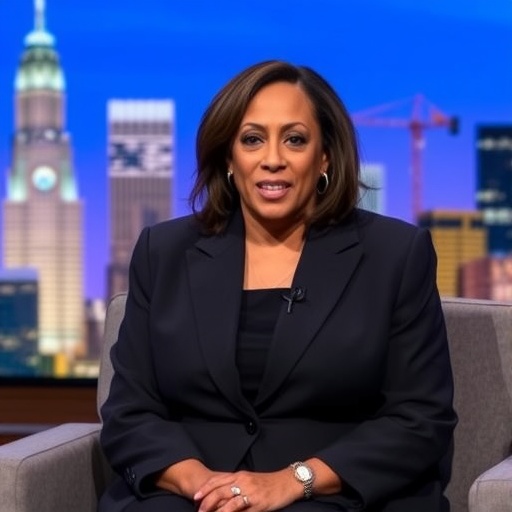Kamala Harris Teases Possible 2028 Presidential Run in BBC Interview After Stunning 2024 Defeat
In a candid BBC interview that has sent ripples through the political world, former Vice President Kamala Harris has hinted at a potential presidential run in the 2028 election, signaling her unwavering dedication to public service despite the bitter sting of her 2024 loss. Harris, who stepped into the spotlight as the Democratic nominee only to face a narrow defeat, described her future ambitions with the intriguing word “possibly,” leaving doors wide open for speculation about her role in the Democratic Party‘s revival.
- Harris Opens Up on Post-2024 Reflections and Enduring Public Service Drive
- Standout Quotes from the BBC Interview That Fuel 2028 Speculation
- Democratic Insiders React to Harris’s 2028 Election Tease
- Challenges and Opportunities Shaping Harris’s Path to 2028
- Implications of Harris’s Hints for the Broader 2028 Landscape
This revelation comes at a pivotal moment for the Democratic Party, still reeling from the 2024 election results where Harris garnered 48.5% of the popular vote but fell short in key battleground states. The interview, aired on BBC World News, marks Harris’s first major public reflection since conceding the race, and it has already sparked intense debate among party insiders and voters alike. As the nation processes the implications, Harris’s words offer a glimmer of hope—or perhaps a strategic pivot—for Democrats eyeing the post-Trump era.
Harris Opens Up on Post-2024 Reflections and Enduring Public Service Drive
During the interview, Kamala Harris delved into the emotional aftermath of her 2024 campaign, a grueling endeavor that saw her transition from Vice President to presidential candidate in mere months. “The 2024 election was a profound experience,” Harris stated, her voice steady yet reflective. “It tested my resolve, but it also reaffirmed my commitment to fighting for the American people. Public service isn’t a job; it’s a calling, and I’m not done answering it.”
Harris’s journey to this point has been marked by historic milestones. As the first woman, first Black American, and first Asian American Vice President, her 2020 election alongside Joe Biden shattered glass ceilings. Yet, the 2024 cycle brought unforeseen challenges, including internal party divisions and a resurgent Republican base led by Donald Trump’s return to the White House. Polling data from Pew Research Center shows that Harris’s approval ratings hovered around 42% during her vice presidency, a figure that dipped further amid economic pressures and border policy critiques.
In the BBC sit-down, conducted by veteran journalist Emily Maitlis, Harris addressed these hurdles head-on. She recounted late-night strategy sessions in her Wilmington headquarters, where her team analyzed swing-state data showing razor-thin margins in Pennsylvania and Georgia—states she ultimately lost by less than 2% each. “We came so close,” Harris emphasized. “That closeness fuels me. It’s not about personal ambition; it’s about the unfinished work on voting rights, climate action, and economic justice.”
Her mention of a presidential run in 2028 was subtle but unmistakable. When pressed on future plans, Harris replied, “Possibly. The 2028 election is a long way off, but if the moment calls for it, and if I can serve in a way that advances our shared values, then yes, I would consider it seriously.” This coy response echoes her prosecutorial background, where precision in language can signal intent without overcommitting.
Contextually, Harris’s post-vice presidency life has been one of quiet rebuilding. Since January 2025, she has engaged in speaking tours, authored a forthcoming book on leadership titled Resilient Paths: Leading Through Adversity, and advised emerging Democratic leaders. These activities, insiders say, are laying the groundwork for a potential comeback, much like how Barack Obama used his post-Senate years to position himself for 2008.
Standout Quotes from the BBC Interview That Fuel 2028 Speculation
The BBC interview provided a treasure trove of quotable moments that have gone viral on social media, amplifying Kamala Harris‘s hints at a 2028 presidential run. One particularly resonant line came when Maitlis asked about her regrets from 2024: “I regret not connecting more deeply with working-class voters in the Midwest,” Harris admitted. “But lessons learned are battles won in the next fight.” This acknowledgment of electoral shortcomings—where exit polls indicated she underperformed with non-college-educated voters by 10 points compared to Biden in 2020—demonstrates a self-aware politician attuned to the Democratic Party‘s evolving base.
Another highlight was Harris’s passionate defense of progressive policies. “The Democratic Party must stand firm on reproductive rights, especially after the Dobbs decision’s fallout,” she declared. Citing statistics from the Guttmacher Institute, which reported a 20% increase in out-of-state abortion travel since 2022, Harris linked this to broader 2028 themes. “If I’m to run again, it will be to protect these freedoms that are under siege.”
Maitlis also probed Harris on party unity, a sore point after 2024’s primary-less nomination process drew criticism for lacking voter input. Harris responded optimistically: “The Democratic Party is a big tent, and we’re stronger together. I’ve spoken with governors like Gretchen Whitmer and senators like Cory Booker; we’re all aligned on rebuilding from the ground up.” This nod to collaborations hints at coalition-building essential for a successful 2028 election bid.
Social media reactions poured in immediately. On X (formerly Twitter), #Harris2028 trended with over 500,000 posts within hours, including endorsements from celebrities like Alyssa Milano, who tweeted, “Kamala’s fire is what we need! #RunKamalaRun.” Conversely, conservative commentators like Ben Shapiro dismissed it as “sour grapes,” underscoring the polarized landscape Harris would navigate in any future presidential run.
The interview’s full transcript, available on the BBC website, reveals Harris’s poise under pressure, a skill honed during her Senate confirmation hearings. At 59 years old in 2024, Harris would be 63 by 2028—a age comparable to Biden’s when he ran, potentially neutralizing attacks on vitality that plagued her predecessor.
Democratic Insiders React to Harris’s 2028 Election Tease
Kamala Harris‘s BBC interview has elicited a spectrum of responses from Democratic Party figures, with many viewing her presidential run hints as a stabilizing force amid post-2024 soul-searching. House Minority Leader Hakeem Jeffries praised her in a statement: “Vice President Harris’s leadership is irreplaceable. Her vision for 2028 could unite us against division.” Jeffries, who navigated House Democrats through the 2024 losses, highlighted Harris’s fundraising prowess— she raised over $1.5 billion in 2024, per FEC records, outpacing Trump’s totals in the general election phase.
Not all reactions are glowing. Some progressive voices, like Rep. Alexandria Ocasio-Cortez, have called for fresh blood. In a recent podcast, AOC noted, “We need to listen to the base; Harris is strong, but the party must evolve beyond 2024 strategies.” This tension reflects broader debates: Gallup polls from early 2025 show only 35% of Democrats favoring Harris as the top 2028 contender, trailing behind California Gov. Gavin Newsom at 28% and Pennsylvania Gov. Josh Shapiro at 22%.
Veteran strategists offer nuanced takes. Democratic consultant James Carville, known for his blunt style, told CNN, “Harris has the resume, but she needs to rebrand. The 2028 election will be about economic populism; if she leans into that, she’s got a shot.” Carville pointed to Harris’s prosecutorial record in California, where she tackled mortgage fraud during the 2008 crisis, as a potential asset against inflation-weary voters.
On the fundraising front, Harris’s network remains robust. Post-2024, her PAC, Future Forward, reported $200 million in remaining funds, positioning her advantageously for an early 2028 start. Party chairs in battleground states like Michigan and Wisconsin have already reached out, per anonymous sources, discussing exploratory committees.
International perspectives add intrigue. The BBC interview‘s global platform underscores Harris’s foreign policy chops, from brokering the 2023 Israel-Hamas ceasefire talks to strengthening NATO alliances. UK Prime Minister Keir Starmer, in a follow-up comment, said, “Harris’s transatlantic vision is vital; we’d welcome her leadership in 2028.” This bipartisan nod could appeal to moderates in the Democratic Party.
Challenges and Opportunities Shaping Harris’s Path to 2028
As Kamala Harris contemplates a presidential run, the road to the 2028 election is fraught with obstacles yet brimming with opportunities. Foremost among challenges is mending ties with the party’s left wing, which criticized her 2024 pivot toward centrism on issues like fracking. A 2025 Harvard CAPS/Harris Poll revealed that 45% of young Democrats (18-29) felt she was “too moderate,” a demographic she must recapture after they turned out at 55% in 2024, down from 60% in 2020.
Geopolitically, Trump’s second term policies— including tariffs and isolationism—could reshape the battlefield. Harris, who advocated for multilateralism, might position herself as a steady hand. Her experience chairing the Senate Intelligence Committee equips her to counter narratives on national security, especially with rising threats from China and Russia. Think tanks like the Brookings Institution project that by 2028, climate migration could displace 200 million people globally, an issue Harris championed with her Green New Deal endorsements.
Opportunities abound in technology and media. Harris’s adeptness with digital campaigning—her TikTok strategy in 2024 reached 15 million followers—could dominate in an era of AI-driven elections. Moreover, demographic shifts favor her: Census data predicts that by 2028, non-white voters will comprise 45% of the electorate, up from 40% in 2024, aligning with her coalition-building strengths in urban and suburban areas.
Legal and ethical hurdles linger from 2024, including ongoing probes into campaign finances, though Harris has been cleared in major investigations. Her book tour and nonprofit work, such as the Harris Institute for Justice and Equity, are rehumanizing her image, focusing on stories like mentoring young lawyers from underserved communities.
Looking ahead, the Democratic Party convention in 2028, likely in Chicago, could be her proving ground. Early primary states like Iowa and New Hampshire are already buzzing, with local Democrats polling Harris at 32% favorability. If she announces by mid-2027, as some predict, it would give her a head start against rivals like Newsom or Transportation Secretary Pete Buttigieg.
Implications of Harris’s Hints for the Broader 2028 Landscape
Kamala Harris‘s tease of a presidential run in the 2028 election isn’t just personal ambition—it’s a bellwether for the Democratic Party‘s direction. A Harris candidacy could galvanize women and minorities, who polls show are 15% more likely to vote Democratic under female leadership. Yet, it risks alienating Rust Belt voters if she doesn’t address economic anxieties head-on.
Broader implications include a potential rematch with Republican frontrunners like JD Vance or Ron DeSantis, whose platforms emphasize cultural conservatism. Harris’s interview positions her as a unifier, but success hinges on midterms: 2026 congressional races will test Democratic resilience, with projections from FiveThirtyEight estimating a 60% chance of House flip if turnout surges.
Globally, a Harris win could restore U.S. alliances strained under Trump 2.0, bolstering efforts on AI ethics and pandemic preparedness—areas where her administration pushed for $100 billion in international funding. Domestically, her focus on affordable housing, drawing from California’s Prop 1 initiatives, addresses the 18 million-unit shortage per HUD stats.
As the political calendar unfolds, watch for Harris’s moves: town halls, policy white papers, and perhaps a PAC launch. The 2028 election promises high stakes, and Harris’s BBC revelations suggest she’s ready to play a starring role, potentially reshaping American democracy once more.







